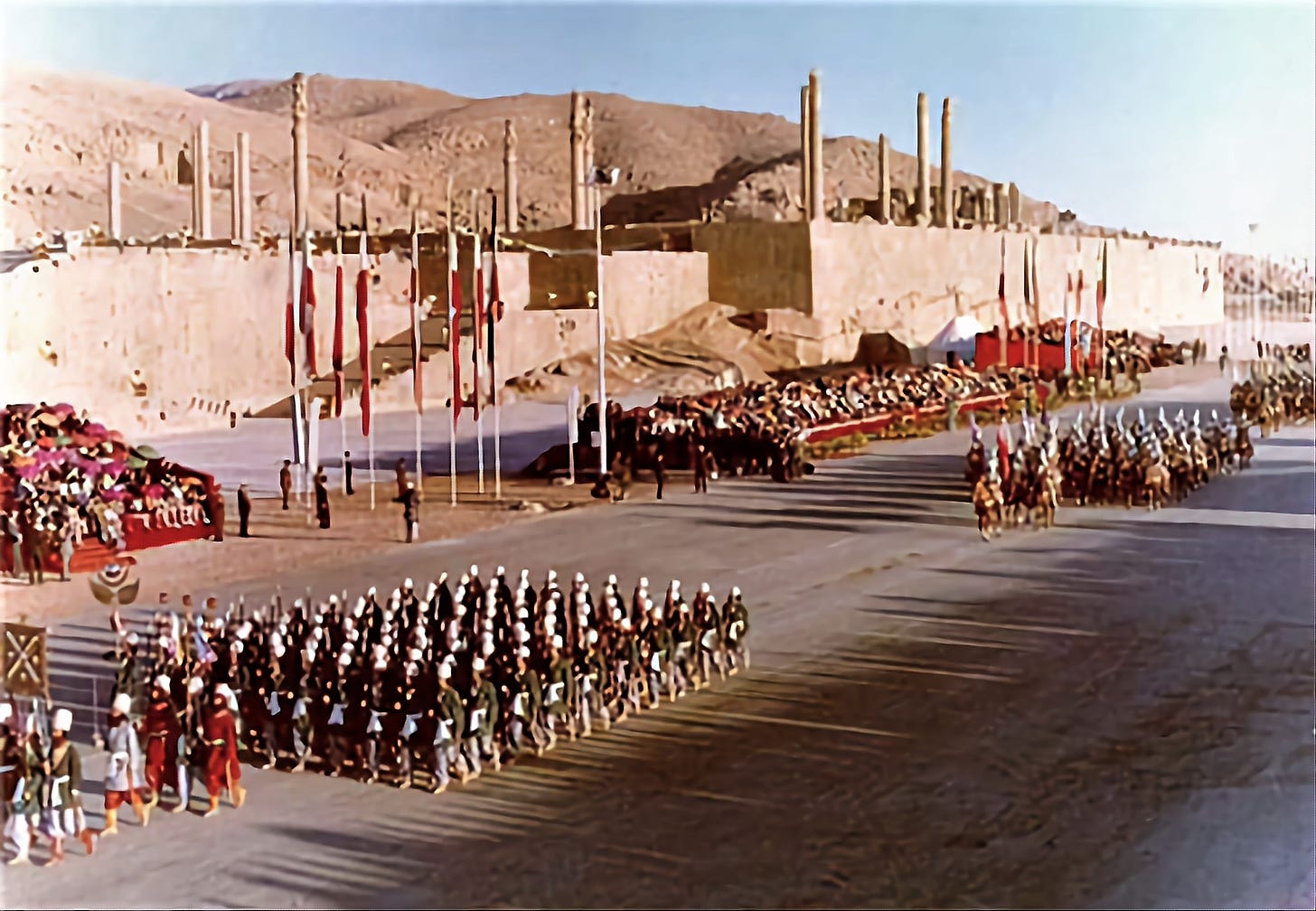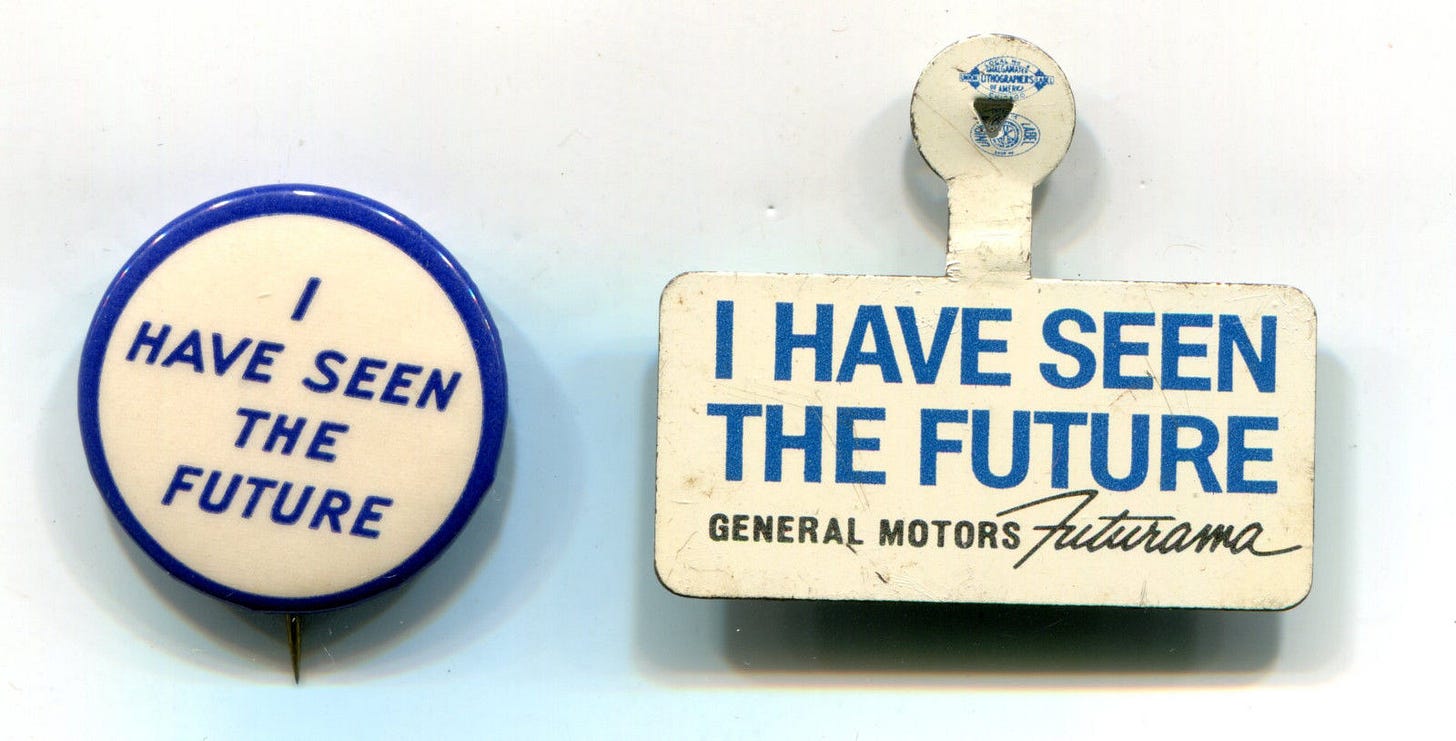Saturday Commentary and Review #121
Insincere Neo-Con Mea Culpas, De Benoist's Rise of 'Civilizational-States', All the Nerds are Dead, The Greco-Roman Custom of Public Endowment, 1939 New York World's Fair
The past few days saw me very busy composing the latest entry in my series on Colour Revolutions and Regime Change. As I was figuring out how to frame it contextually, a question popped into my head: “Is there really a difference these days between neo-conservatives and liberal interventionists?”
My answer to that question is: not really. To be honest, there wasn’t all that much of a difference to begin with when these two terms were popularized a little over two decades ago. Liberal interventionists (like Samantha Power) sought to use US military muscle under the fig leaf of legitimacy provided by the United Nations to push US foreign policy objectives in the name of “democracy” and “human rights”. They were emboldened by their perceived successes in the 1990s, particularly in Bosnia and later on in Yugoslavia during the war over Kosovo. Liberal interventionists were at home with the US Democrats.
Neo-conservatives were originally described as “liberals mugged by reality”. These were former Democrats who moved away from that party during the 1960s and 70s, ending up squarely in the Reagan camp by the 1980s. Known for hyper-interventionism without the need of UN support (aka ‘unilateralism’), they sought to expand US Empire to all corners of the globe in the wake of the collapse of the Soviet Union. At the same time, they were closely linked to Israel’s Likud Party, seeing the Jewish state as the natural regional hegemon in the Middle East. Like the liberal interventionists, they too cloaked their aims with appeals to “democracy” and “human rights”.
The neo-conservatives were the architects of Dubya’s disastrous foreign policy, one that saw America being held in high esteem and awash in global sympathy after the 9/11 attacks, to a country viewed as a reckless bully deserving a comeuppance only a few years later thanks to its invasion, occupation, and destruction of Iraq. They had their turn at the wheel, and they blew it. The neo-cons withdrew (only slightly), to lick their wounds and to re-calibrate.
They never entirely went away. Big name neo-conservatives like David Frum and Bill Kristol continued to be given air time in mainstream media despite their obvious failures, while staffers like Vicki Nuland easily segued between Dem and GOP administrations, influencing their foreign policies towards Russia. What they all had in common was a strong belief that the war that they launched in Iraq was “good”, and that they deserved to lead on the foreign policy front again.
Cynically and opportunistically, the neo-cons wormed their way back into the good graces of the public-at-large and in policy-making circles by jumping aboard the anti-Trump train. Overnight, these craven warmongers and war criminals received the blessing and support of the Dems who showered them with all the love and affection that they could offer. The neo-conservative redemption arc was in full swing.
Over the past few months, we have seen the end of that redemption arc via the public ‘mea culpa’ statements from many of these neo-conservatives regarding their role in pushing for the war in Iraq. It’s rather easy for them to do this now as the war is ancient history in the modern American context, and because they have been fully rehabilitated in the eyes of the public thanks to their public anti-Trump stance in the media. David Polansky sees through their craven opportunism:
The 20th anniversary of the U.S. invasion of Iraq is one such instance, and it brought out a Rashomon-like display of conflicting accounts from major players of the time. Most egregious of these, to my mind, are from those figures who then distinguished themselves by their enthusiasm for the war, and now feel compelled to correct the record for their benefit.
Some, like Paul Bremer and Eli Lake, insist on accentuating the positive. Some, like Max Boot and Robert Kaplan, are now (two decades hence!) prepared to disavow the war that caused so much destruction. And others, like David Frum, prefer to take the “mistakes were made” line. I think it is telling that we are seeing these apologias now from a certain cohort: those old enough to have played some role in the events of the time, but young enough that their careers are in some sense still in the balance. Having played an outsized role in authoring the events of the time they now seem bent on authoring its history as well.
“Real war in Iraq/exporting democracy has never been tried!”
The wonderfully convenient part about advocating war against Iraq was how it allowed one to thread the needle between spirited anger and liberal conscience. Yes, we were in fact going to bring the might of the world’s only superpower against an Arab country, but we were going to do it in the service of democratic ends. Indeed, by this logic, it was those opposed to the war who could be tarred as racists for supposing that Arabs were not ideal candidates for democratization. This transparently expedient bit of sophistry proved surprisingly effective at the time, and likely played a role in making the war as popular as it in fact was, at least up until the summer of 2003, when certain realities began to set in.
“Exporting democracy” reminds me of the Christian heresy of “immanentizing the eschaton”: at the time, the western world was convinced of the superiority of liberal democracy, and its inevitability, so some insisted that it must be exported globally at the barrel of a gun.
On the military fervour of those heady days:
Looking back, some words of Thucydides seem particularly apt: “Reckless audacity came to be considered the courage of a loyal ally; prudent hesitation, specious cowardice; moderation was held to be a cloak for unmanliness; ability to see all sides of a question, inaptness to act on any.”
Or, more succinctly: “The advocate of extreme measures was always trustworthy; his opponent a man to be suspected.” Those words concerned the terrible revolution in the ancient city of Corcyra. And while we Americans happily made out quite a bit better than the unfortunate Corcyrans, the countries that have periodically occupied our attention were rarely so lucky.
Only the war crime that was Iraq outweighs this one:
Moreover, our own advocates of extreme measures are not only still mostly alive and kicking but continue to enjoy influence and esteem out of all proportion to their wisdom or track record of success. (How they effectively latched their own agendas onto the prevailing anti-Trump sentiments of the past several years is its own, and frankly quite irritating, story.) The truth here is that your career will suffer far more from being right in opposition to military action than in being wrong in favor of it.
Does any of this matter? Is all this just a matter of the amour propre of a handful of pundits and the ire of their critics? Alas, yes it does. Irony of ironies, but the disastrous neoconservative track record in foreign policy has proven no bar to its influence. Indeed, in a series of events that would require far more words and time to unpack, even as neoconservatism itself functioned as a kind of rhetorical bogeyman throughout much of the first decade of this century, its ideas successfully permeated the geopolitical thinking of our entire policy making establishment.
One no longer has to look to the old bylines like Kristol and Kagan for unvarnished declarations of primacy (though the fact that Robert Kagan’s wife has played an outsized role in events surrounding Ukraine since before 2014 is but another page in this book…). The ideas themselves—of the necessity of American global might, the perfidy of its enemies, and the moral cowardice of attempting to weigh interests in the balance—these are now mainstays of our foreign policy discourse.
They were present during the interventions in Libya and Syria, and they are strongly present now as we become ever more involved in the defense of Ukraine. This way of thinking no longer represents a particular disposition when it comes to U.S. foreign policy but is, for all intents and purposes, coextensive with the policymaking establishment itself.
There has been a convergence between liberal interventionism and neo-conservativsm (with Iran the only slight difference remaining between the two camps, and Bibi now being considered gauche) since Trump took office in 2017. They now share the driver’s seat for US foreign policy.
For those of us who opposed the war in Iraq, the regime change in Libya, the failed attempt in Syria, etc., being right is no defense.
I often get accused by people of being a pessimist (or ‘blackpilling’, in online lingo) due to the content of my writing. My retort is that I am a realist and that being able to understand reality is the first step in trying to construct a solution to what ails us. Without having a firm grip on reality, we are relegated to fantasy.
In my opinion, an important exercise for all realists is to constantly engage with thought and argument that runs counter to your own, in order to test your own views and beliefs. This is one of the reasons why I will share content with you from people who can be found across the whole of the political spectrum. If what they present is interesting, intelligent, or informative (or a combination of the three), I will share it with you. In the process of sharing we might all learn something, we might change our own opinions, or we could learn how opposing views are constructed and upon which basis they are founded. There is value in broadening our range of sources, provided that the content is of a certain standard.
By now, all of you should know how attached I am to the concept of the ‘nation-state’. I strongly believe that the nation-state (where the people share the highest degree of commonality in geography, language, culture, and history) is the most stable polity known to mankind. At the same time, I am aware that not all nation-states are equal, and that many require attaching themselves in the form of alliances with greater powers in order to preserve the maximal amount of sovereignty that they can extract from it.
The trend of the past several decades in the West has been one where the elites are becoming post-national in the sense that more and more power is being delegated to international institutions and conventions (although critics of this view, like myself, see much of this offloading serving US hegemonic ambitions). Are we headed towards a post-national state of affairs?
French intellectual Alain de Benoist is convinced that liberal internationalism has conquered the nation-state. In this brilliant essay, he argues that the only thing standing in the way of the triumph of liberal internationalism is the ‘civilization-state’.
Three great competing paradigms confront each other at the present time to determine the nature of the nomos of the Earth, that is to say, the emerging world order: liberal internationalism, the nation-states born of the Westphalian system, and civilizational states.
Liberal internationalism is based on the classic themes of liberal thought: the rule of law, the protection of individual rights guaranteed by the constitution, the primacy of procedural norms, parliamentary democracy, the market economy, all notions proclaimed universal and properly “human”—which is only possible by forgetting their history—so that those who refuse what is ritually presented to them as “freedom and democracy” are immediately placed outside humanity and thrown back onto the “axis of evil”, liberalism interpreting as “aggression” any resistance to the expansion of a way of life based on individualism and capitalism.
The ‘major contradiction’ of the liberal system:
We can see from this that the liberal system is the prisoner of a major contradiction: on the one hand, it is theoretically based on fundamental tolerance vis-à-vis all individual choices, which leads it to defend the idea of a necessary “neutrality” of the public authorities (in France, this is also the foundation of “laicism”). On the other hand, it wants at all costs to extend its individualistic values to the whole world to the detriment of any other system of values, which goes against its principle of tolerance. It is not content, for example, with affirming the universal and absolute superiority of liberal democracy. Instead, it intervenes to impose it everywhere in the world, by multiplying interference of all kinds, so that what was at the start a simple theoretical option becomes the alibi of the most brutal imperialism.
Popper’s “Paradox of Tolerance” on the global scale.
The nation-state and how liberal internationalism overcomes it (and will often use it as well):
The nation-state, on the other hand, is conceived as the basic political unit in an international order, enshrined in the United Nations, where each country is supposed to be able to assert itself as sovereign. Rejecting the pluralism inherent in imperial power, it draws justification from a single people, a single territory, and a single political community, which is why it does not support differences and tends to homogenize its internal components.
Liberal internationalism is not the enemy of nation-states in principle, insofar as they are always susceptible to being colonized by the former’s values—and we know just how much the liberal international order has achieved this goal by imposing, pretty much everywhere in the world, the principle of the universal legitimacy of liberal democracy (which Friedrich Hayek described as “constitutional protection of capitalism”) and the rules of the market. From a liberal point of view, nation-states are no longer an obstacle to the expansion of global markets.
On the political and military fronts too, liberal internationalism does not hesitate to support nationalism when it seems necessary to extend its influence: this is the case today with the war in Ukraine, where the United States provides massive support to a country that seeks to develop into a nation-state, presumably because this support is in line with the interests of America’s liberal internationalist establishment.
‘Civilization-states’ are a different matter altogether, as they are an impediment to global liberal triumph:
So what are these newcomers to whom some writers have given the name of “civilizational states” (or civilization-states)? They are regional powers whose influence extends beyond their borders and who conceive the nomos of the Earth as fundamentally multipolar. Originally, the “civilizational state” label was reserved specifically for China and Russia, but this qualification can be applied to many other states which, by leveraging their culture and their long-running history, manage to project a sphere of influence exceeding their national territory or their ethno-linguistic group: India, Turkey, and Iran, to name but a few.
Civilizational states set against Western universalism a model according to which each civilizational group is considered to have a distinct identity, both in terms of cultural values and in political institutions, an identity that is not reducible to any universal model. These states do not simply want to pursue a sovereign policy without submitting to the dictates of supranational elites. They also seek to thwart any “globalist” project aimed at making the same principles prevail throughout the planet, because they are aware that the culture they embody is not identical to any other. Here we must bear in mind that no single culture can encompass all cultures; the notion of a “world culture” is a contradiction in terms.
The common characteristic of the ‘civilization(al)-state’:
Civilizational states have the common characteristic of denouncing Western universalism, which they regard as a masked ethnocentrism, an elegant way of concealing hegemonic imperialism. But above all, the civilizational states rely on their history and their culture, not only to affirm that these imply a political and social model different from the one that liberal internationalism seeks to impose but also to identify a conception of the world deemed to be the foundation of a “good life”, both politically and religiously—that is to say, built on a set of non-negotiable, substantive values that the state then has the mission of embodying and defending.
The civilizational state, in other words, seeks to establish a conception of the good that is based on particular substantive values and a specific tradition.
A new era?
The recognition of the crisis of universalism and Western hegemonism, therefore, goes hand in hand with the feeling that the era of the international order based on the conflicting balance of nation-states has come to an end, as foreseen by Carl Schmitt as early as the 1930s. The rise of civilizational states marks the beginning of an era when the world order can no longer be encapsulated by the unstable balance of nation-states. With civilizational norms becoming a pivot of geopolitics, the main axis of competition is no longer that which traditionally exists between nation-states, but one which is asserting itself between civilizations. Civilizational states thus reveal a new mode of sovereignty that transcends that of nation-states.
This argument immediately calls to mind Samuel P. Huntington’s “The Clash of Civilizations and the Remaking of World Order” from less than three decades ago.
“Civilization” meaning one thing to the liberal order and another to the civilization-state:
Liberals always claim to “defend civilization” which, in their view, merges with the logic of individual rights and the market. Civilization, for them, must be understood in the singular and it is the liberal democracies that embody it: anyone who deviates from it leaves the “civilized world”. Those who refuse to comply with this model are immediately delegitimized and denounced as antidemocratic and “authoritarian powers”, as if liberal democracy were the only form of democracy possible. It is this idea of Civilization in the singular that legitimized colonization in the past, before inspiring Fukuyama’s speculations on the “end of history” in a world devoid of all power relations. For civilizational states, on the contrary, civilizations (or cultures) can only be understood in the plural. Civilizational states do not defend “civilization” as such, but their civilization.
Who are the real lovers of diversity?
He ends on a pessimistic note for us Europeans:
As for Europe, culturally and ideologically hybrid for two millennia, it is for the moment nothing but a neutralized space where opposing civilizational conceptions clash.
….and he is right to assert this conclusion.
What happens to a person when their purpose in society is rendered superfluous to its needs? They become an anachronism. This can take the form of eccentricity, but more often than not it results in sadness and loss. Cultures come and go, and so do the subcultures that underpin it.
When I was young, some people would call me “Encyclopedia Nic” because I seemed to always have some random bits of (almost always useless) information on hand and ready to deploy in any conversation. I recall being asked by a friend in the early 2000s whether Google had made me redundant, as information was incredibly easy to locate thanks to this new technology. He raised an excellent point (the answer was still “no”, btw), one that led me to think about how shifts in technology not only affected society, but individual character as well.
is a notable writer (and a pretty good one, too). He looks at how rapid shifts in technology first killed off the 'Hipster', and are now about to genocide the 'Nerd' as well.It’s been about a decade since we killed all the hipsters. The last genocide ever perpetrated against white people. There are mass graves, still, just outside the major cities, places we don’t really want to think about: heaped thousands of hipster skeletons, each still wearing the tufts of its big lumberjack beard, sealed forever in artisanal wax. We lashed the hipsters to their fixies and herded them off a cliff. We burst into the Vice offices in Old Street and hacked them to bits with machetes. We put botulism in all the PBR. We made the hipsters kneel down in front of a wall. Wait, the hipsters said, you don’t have to do this, I’m not really a hipster, there’s actually no such thing as a hipster. That’s great, we said. If you’re not a hipster, then this is not happening to you. And then we pulled the trigger.
We had to do it, you understand. These people left us with no choice. They were very, very annoying.
I recall when Adbusters published a piece well over a decade ago declaring hipster ‘irony’ the end stage of culture (republished years later here). Kriss argues that the hipster had his/her purpose in culture at the time:
The hipster was an information-sorting algorithm: its job was to always have good taste. The hipster listened to bands you’d never heard of. The hipster drank beers brewed by Paraguayan Jesuits in the 1750s. The hipster thought Tarkovsky was for posers, and the only truly great late-Soviet filmmaker was Ali Khamraev. The hipster bought all his toilet paper from a small-batch paper factory in Abkhazia that included small fragments of tree bark in the pulp. The hipster swam deep into the vastness of human data, and always surfaced with pearls. Through its powers of snobbery and disdain, the hipster could effortlessly filter out what was good.
That was the theory, at least. In fact, the hipsters were generally very bad at their job. Most of the stuff they liked was awful. They flourished in a brief gap: after we started producing impossible volumes of information, but before we had the technological means of efficiently processing it. In the 2000s, the best tool available was keyword search, the utility of which drops in line with the size of the data set. We still needed people to like things manually. But in the 2010s, we developed algorithmic processes capable of efficiently discerning patterns in the ungodly excess of human cultural production and sorting it appropriately. The hipsters were no longer required.
Algorithms rendered the hipster redundant.
The Nerd:
For the last decade, mass culture has been nerd culture, and a nerd is someone who likes things that aren’t good. This is not to say that everyone who likes things that aren’t good is a nerd. Fast food is bad food: cheap, tasteless, unhealthy, and unsatisfying. But if you grew up eating frozen burgers as an occasional treat, and you still find it nice to sometimes stumble drunk into a McDonald’s late at night and wolf down a Big Mac—because it reminds you of something, because it’s the sign for a certain vanished pleasure—then you are not necessarily a nerd. But imagine a person who collects the boxes from every McDonald’s order he’s ever made, who’s yapping with excitement about the new McDonald’s partially hydrogenated soybean-canola oil blend, who can’t wait for them to release the McBento in Japan so he can watch video reviews all day, and who acts incredibly smug every time McDonald’s posts its quarterly earnings and they’re growing faster than Burger King’s. You know exactly what this person looks like. A total failure of an adult human being. Fat clammy hands; eyes popping in innocent wonder at every new disc of machine-extruded beef derivatives. An unbearable, ungodly enthusiasm. Does he actually like eating the stuff? Maybe not. It hardly matters. His enjoyment is perverse, abstracted far beyond any ordinary pleasure. It signifies nothing. This person is a nerd.
The hipster was supposed to have good taste. The nerd likes stuff for the sake of liking it:
The nerd doesn’t like bad things because of their actual qualities; the nerd likes bad things simply because they’re there. What counts is collecting, itemising, consuming.
Kriss goes on to lay the blame of Nerditry at the foot of artist Andy Warhol, borrowing from French philosopher Jean Baudrillard’s critique that Warhol’s art was ‘non-art’.
To me, a crime against humanity was committed in 1984 with the release of the comedy “Revenge of the Nerds” as it upended long-existing social hierarchies that served us well up until that point. This gave courage to dweebs, geeks, and the “loser culture” that arose via the music of the early 90s, specifically bands like Nirvana.
Nerds are destined for the dustbin of history because not everyone is a nerd, and the algos are failing:
But not everyone has the good fortune to be a machine: most people are not nerds. Most people will passively accept culture produced under the regime of alibidinal information-sorting algorithms, if it’s the only thing available—but only up to a point. After that point, they will simply check out, which is exactly what they’re now doing. It’s not just Marvel: nerd culture is collapsing everywhere. Sequels and franchises no longer drag as many people into the cinemas. The ecstatic boyband fans have gone quiet: increasingly, new music in general is being oucompeted by Spotify’s century-long back catalogue. Over the last year, sales of books in print went up by 4.2%—except for young adult novels, which have declined. As I’ve argued previously, algorithms in general are starting to collapse. The nerd world is dying. And since the nerds gravitate towards homogeneity and popularity, their extinction will be total. Soon, very soon, every single one of them will be dead.
I suggest that you read this fun cultural critique in full from a solid writer who I am certain will find reasons to not like me/loathe me/denounce me publicly soon enough.
Doesn’t matter…it’s still a good read.
“Oh man….he’s just like me!”, is an internet meme depicting a guy on his couch watching a big screen television, identifying with a person or character (usually heroic or cool) on that same screen with whom they actually have very little in common.
Identifying with greatness (or at least with good or admired qualities) is common to us all. I would argue that it is psychologically healthy to do so as it can make us strive to emulate the good qualities that we have identified in those we admire.
“RETVRN” is another popular meme, where RETVRN = Return to a previous, better time in human history. This is also another consistent theme in human psychology; the idealization of a certain bygone era in comparison to the critical eye cast on the contemporary one. US conservatives are criticized for wanting to “return to the 1950s”. Some Catholics are caricatured as wanting to go back to the Medieval era.
Classical Greece and Rome have held a grip over the imaginations of Europeans for centuries thanks to how much they have influenced our culture(s) and societies over time. Were they like us? Are we like they were? Carlos Norena delves into these questions via the work of French historian Paul Veyne:
All historians acknowledge differences between past and present, of course, and sometimes quite significant differences, in terms of technology, economic organisation, social structure and so on, but most end up treating the people of the past more or less as versions of ourselves, caught up in different contexts, to be sure, but essentially interchangeable with us. Not many scholars, that is, are quite prepared to dive into the deep alienness of the past.
The French historian Paul Veyne, who died in September 2022, at the age of 92, was one who did. A student of the ancient Roman world, Veyne was a towering figure in ancient history and Classics, celebrated for his lively historical imagination, revisionist and often daring arguments, and breathtaking knack for defamiliarising the ancients whom we thought we knew. His lesson is important for everyone interested in the long ago.
On the ancient custom of public endowment:
The dangers of getting things wrong by assuming a casual familiarity with antiquity are revealed when we consider a topic of enduring fascination to ancient historians: the widespread phenomenon of public giving and civic benefaction in the Greco-Roman world. At a glance, this public giving looks a lot like the contemporary practice of high-profile charitable donations, the establishment of major foundations, the patronage of the arts, and so on. And there are indeed some similarities between ancient magnates and their modern counterparts when it comes to such public displays of generosity. Through a closer look at the expenditures of the Roman elite in particular, though, we can discern the outlines of a historically distinctive modality of public giving. It was Veyne who provided that closer look in the 800 pages of his masterwork, Le pain et le cirque: Sociologie historique d’un pluralisme politique (1976), translated as Bread and Circuses: Historical Sociology and Political Pluralism (1990).
The whole practice of public expenditure and civic benefaction in the ancient Mediterranean world has come to be known as ‘euergetism’, a neologism derived from ancient Greek and meaning, literally, ‘the doing of good deeds’. In the Roman Empire, what euergetism meant in practice was the transfer of wealth from the private to the public sphere. The arena in which this transfer played out was the local municipality. At the lower end of the scale of civic benefaction was the organisation and funding of public banquets and public entertainments, such as gladiatorial combats. Higher-order benefactions included the beautification of dilapidated public buildings, the restoration of infrastructural works that had fallen into disrepair, and the establishment of perpetual endowments. The truly big-ticket items were the major public buildings financed by local elites, the grand monuments that travellers to any part of the Roman Empire still encounter today: temples, theatres and amphitheatres, libraries, public baths, colonnades and basilicas. These structures could be found, in different but recognisable shapes and sizes, from Rome and the dazzling metropolises of the East to the smaller cities and towns of North Africa, Spain and Gaul.
What motivated this largesse?
Some of these expenses were met by the Roman emperor, and some were covered by local revenues. But the lion’s share was paid for, out of their own pockets, by the local, landowning elites of provincial cities. The crux of the interpretive problem lies in the question of motivation. Why did local elites not reserve such spending for their own private villas in the countryside, far away from the demanding and unruly masses in the centre of town?
This question is complicated by the fact that elite giving was partly compulsory and partly voluntary. Those elected to local office were either required or expected (with lots of slippage between the two) to make some sort of public expenditure, from their own, private wealth, in connection with holding the public office in question. The benefactions that resulted merge almost imperceptibly into those that were given freely, at least notionally, and not directly connected with any official responsibility. Both types of generosity, the compulsory and the voluntary, also triggered a symbolic reciprocation in the form of public honours voted by fellow citizens. The fact that public office itself was called honor in Latin (and its equivalent in Greek, timē) captures some of this reciprocal dynamic.
Veyne’s take:
Veyne was particularly emphatic that the transfer of private wealth into the public sphere was neither redistribution nor a form of depoliticisation – which is what most of us today understand by the phrase ‘bread and circuses’.
Following an extended discussion of all the things that Roman euergetism was not – a tour de force of historical sociology that repays close reading – Veyne finally reveals what the practice was at its core. The key observation concerned the extent of private expenditures, which went far beyond what would have been necessary to secure public office or even to reinforce social standing. The massive and over-the-top spending was instinctual, on Veyne’s reading, seemingly unselfconscious and routinised, and often wasteful. In other words, in analysing the whole practice of euergetism, he pivoted away from practical explanations towards psychological ones. Public giving was a natural expression of grandeur, and the expression was an end in itself.
This is an interesting essay. Click here to read the rest.
We end this weekend’s Substack with a fun look at the 1939 New York World’s Fair courtesy of
.On its significance:
So much of what would become modern America was on these fairgrounds. The American frontier—officially settled in 1912 with the admission of all the contiguous states of the Union—was moving to a new psychic plane. As the Fair demonstrated, the new untraveled frontier was now to be desire itself. A 20-minute film for the most popular exhibit at the Fair named Futurama opened by telling viewers that “the promise of distant horizons has always called men forward.” The film associated the frontier’s original, rugged roads with the new roads being forged in the mind: those untraversed desires and new ways of living that consumer society would bring.
“Men have moved on and on,” the film declared, “always to find that old horizons open the way to new horizons.”
I’ve been reading quite a bit about the 1939 World’s Fair recently. My interest has been not only in the sights, as spectacular as they were, but also in the ideas they represented. Rarely do you see so much ideology and meaning condensed into one event.
I’m of the opinion that any critique of the present is best done by understanding when its justifications were at their height, optimistic and full of hubris. Arguably, the 1939 World’s Fair was that moment. Yet, our vantage point is altogether different from the Fair’s attendees. Our world is no longer like theirs, and what was dreamlike then might easily appear otherwise to us today. So rather than recount the experience of the Fair as has been often told, I would like to instead turn to what the attendees did not readily see but had great consequences for the present day.
Many of the Fair’s attendees received a pin that famously read, “I have seen the future” and, in many ways, this was right. Americans would come to inhabit that promised future, but its repercussions were poorly understood. Looking back, the 1939 World’s Fair stands as an inflection point for how the U.S. would develop, but it was as much a forewarning as it was a dream.
Click here to read the rest.
Thank you once again for checking out my Substack. Hit the like button and use the share button to share this across social media. Leave a comment below if the mood strikes you. And don’t forget to subscribe if you haven’t done so already.
And don’t forget to join me on Substack Notes!















This one was late as I was up until midnight last night finishing off this essay - https://niccolo.substack.com/p/ukraines-orange-revolution-2004-05 (please check it out, it's good!).
Hit the like button at the very top of the page to like this entry and use the share button to share this across social media.
Leave a comment if the mood strikes you to do so (be nice!), and please consider subscribing if you haven't done so already.
...and don't forget to join me on Substack Notes - https://niccolo.substack.com/p/introducing-substack-notes
Your mention of the neo-conservative "redemption arc" is especially thought-provoking. It's remarkable how quickly political actors can shift their allegiances and be welcomed back into the fold by the very people they once opposed.